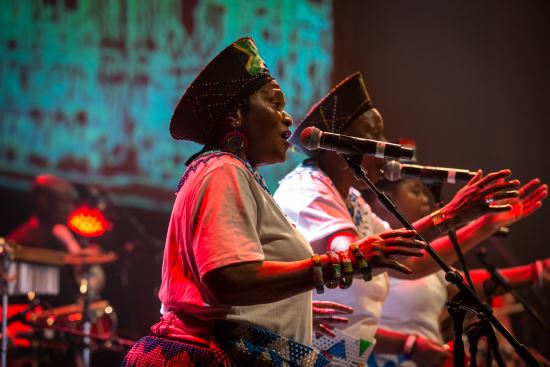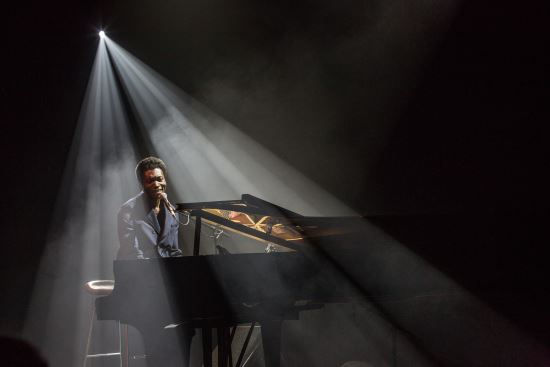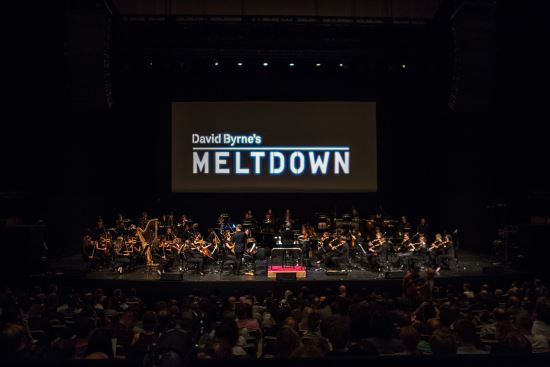Jonny Greenwood/London Contemporary Orchestra – There Will Be Blood
Watching a band, or in this case orchestra, provide a live soundtrack to a film really highlights the essential strangeness of movie music. We take for granted the presence of this additional layer of unreality in cinema, even as it plays with our emotions. It renders all films, whatever their vérité aspirations, as dream-like – and it’s a quality that Jonny Greenwood’s score for Paul Thomas Anderson’s epic morality play ramps up to the max.
The orchestra creates an eerie discordant drone over the mostly wordless opening section as Daniel Day-Lewis’s Daniel Plainview doggedly digs first gold then oil out of the ground, providing a sinister counterpoint to his slow accumulation of capital and power. It reminds me of the way in which Ligeti’s ‘Lux Aeterna’ is used at the beginning of 2001: A Space Odyssey, just before early man learns how to bash his enemies’ skulls in. The recurring theme of the Gorecki-esque ‘Open Spaces’ evokes a sense of uncertain hope, while the damped percussive strings of ‘Proven Lands’ act as the obsessive heartbeat of industry.
In this live setting, the music occasionally obscures the dialogue, creating a new kind of tension in the viewing experience – we start to watch the orchestra instead of the film. Throughout, Greenwood sits discreetly in the centre of the ensemble behind what looks like a child’s writing desk, but is in fact his trusty ondes Martenot.
While movie music can be intrusive or banal, the best soundtracks are those that offer an alternative or heightened perspective on what’s happening onscreen. As this performance showed, There Will Be Blood is a superlative example of how music can create a subconscious, inner life for a film. Joe Banks

Atomic Bomb! The Music Of William Onyeabor
William Onyeabor could be the greatest electronic musician you’ve never heard of. A certainty is that the Nigerian synth/funk pioneer’s output would’ve been lost without record label Luaka Bop, who formed Atomic Bomb! to celebrate his music- a band featuring Hot Chip’s Alexis Taylor (vocals) and Sarah Jones (drums), Beastie Boys’ Money Mark (keyboards) and the Sudanese multi-instrumentalist Sinkane. Joining Atomic Bomb! at Meltdown were South African mbaqanga legends the Mahotella Queens, Mali’s Amadou & Mariam and David Byrne himself, who came dancing onto the stage a few songs in wearing a skinny electric blue suit and red Stetson hat.
Even before Byrne’s entrance, the achievements of Talking Heads in breaking down that oft-criticised label of ‘world music’ were etched into the funk loving, groove-centric rhythm and percussion of Atomic Bomb!. This was instead pure dance music, something which taps a deep human impulse; within minutes the crowd were out of their seats and gravitating towards the stage, clapping and whooping under a slick visual display of vintage Nollywood clips. The speed increased – thanks largely to Jones’ skill as a relentless pacemaker – toward the show’s brilliant climax, which saw a 180-piece choir snake out of the theatre wings to whip Atomic Bomb! into a trance-like sensory overdose. Clyde MacFarlane
Young Marble Giants
Seeing YMG at Dingwalls last year, I was somewhat in my cups and a little overexcited at the once unimaginable opportunity to see these Cambrian minimalist micro-legends. During one characteristically clunky break between numbers, Stuart Moxham noodled on his unmistakable Galanti electric organ. Into the ensuing awkward silence I yelled "Raw Sex!" The reverential audience murmured and tutted but to my drunken satisfaction Moxham searched me out with a smile, acknowledging the impertinent comparison to Roland Rivron’s tawdry end-of-pier cabaret duo.
Bumbling humour and middle aged self effacement may dilute the once enigmatic aura of these former bedsit existentialists, but the presentation helps belie any winsome diffidence. Emerging from shadows and muted white lighting come the twisted funk bass runs, clipped Rickenbacker, abstract ambience and lyrical conceits that always had real swagger and bite. Killer appeal, in fact – I know someone who once considered pushing their best mate under a bus after they’d pipped them to Nottingham Selectadisc’s last available copy of Colossal Youth. Still those borderline cheesy organ lines anchor their sound in the pinched, humdrum, suburban reality against which they make the mighty stand implied by the imagery of their name and sole album title.
And then there’s Alison Statton’s disarming equanimity. One of pop music’s most brilliantly realised characters – created almost inadvertently on joining the band against Moxham’s wishes – she delivers a tonally neutral reportage from a world of casual disappointment (dedicating ‘Searching For Mr Right’ to "Maria and Keith…and every other happy couple out there") and grand folly (‘Final Day’). She drily claims enduring relevance for ‘Credit In the Straight World’ in light of "recent events in the financial markets". Its saturnine black key notation seem entirely à propos, and once made it the obvious candidate for hijack by YMG’s grunge admirers: Kurt loved ’em, Courtney did the cover. Contrasting the original with the latter’s snarling bombast only serves to highlight the power of its awesome sonic restraint. The arpeggiated release on the final verse’s plaintive request to "go for credit in the real world, won’t you try?" makes the heart soar with unrequited hope tonight as much as ever.
A quiet voice offering empathy to the bewildered seems right for our cacophonous times. Welcome back then to a one off one album band and, simply, one of the best. Maddy Sparham
Benjamin Clementine
Benjamin Clementine cuts a strikingly enigmatic figure. Barefoot and wearing what looks like an undertaker’s coat buttoned over his bare torso, he towers over his piano, summoning from it a mix of skeletal blues, cabaret, Great American Songbook tunes, jazz and gospel that’s as eccentric as you might expect of anyone who’s largely self taught. "I hope you were expecting this," is his quiet greeting, before the revelation of a voice that can drop from richly resonant roll to tremulous falsetto and faint whisper in one athletic stretch.
The young Londoner has a compelling back story, involving a deep family rift, living rough in Paris and busking on that city’s Metro, but his talent has no need of narrative embroidery. And if some of his influences are obvious – Nina Simone, Antony Hegarty, Paul Robeson – others are less so. ‘Cornerstone’ betrays an admiration for Springsteen, although no romantic filter on earth could soften Clementine’s expression of rejection, isolation and abject loneliness. ‘Condolence’ and ‘Adios’ are highlights: on the former, his playing is heavily, hypnotically rhythmic and at one point his hands leave the piano to beat out a rat-tat-tat on its polished top, as his voice alone carries the melody; by contrast, the latter is all rolling, panoramic drama, Clementine’s improv poetics suggesting his songs are as much visitations as compositions – "try to sing them, though… don’t always do it… don’t understand it." Charismatic freeform drummer Alexis Brossard joins him on several numbers, including the set’s fiery closer, which bucks and roils in a series of peaks contrasted with sudden drops into silence. "Bendy buses, bendy buses," mutters Clementine in those spaces, lost who knows where. Sharon O’Connell

Lonnie Holley & Alexis Taylor
Lonnie Holley first came to David Byrne’s attention through the outsider art he constructed from found objects in his yard in Alabama. But it is for his primal avant-garde blues that he has become better known. Since his LPs Just Before Music and Keeping a Record of It, Holley has appeared at a number of festivals including Tennessee’s Big Ears, where The Quietus saw him last year. So we were interested to see how he would command the more illustrious QEH stage.
But first Hot Chip’s Alexis Taylor takes to the stage. He opens with a new track ‘I’m Ready’, bringing to mind the more soulful end of Laurel Canyon. There are also touches of country in his delivery, and it makes perfect sense when he covers Crystal Gayle’s ‘Don’t It Make My Brown Eyes Blue’. The Robert Wyatt leanings of ‘Without A Crutch’ (from Await Barbarians) are also quietly uplifting, as is Hot Chip’s ‘So Much Further To Go’. An appearance by Green Gartside for their About Group composition ‘Repair Man’ rounds off a rather sublime set.
Lonnie Holley’s music is constructed in a similar style of assemblage to his art, and there is always a sense that it might just fall apart. That only makes his live shows even more captivating. But his loose improvisations and collages of words, hollers, and the odd languid whistle are given new depth tonight. And that’s largely down to the loose limbed drumming of Steven Nistor and the bowed cello of Dave Eggar. There is also something less precarious and DIY about Holley’s own playing, particular when he moves from his analogue keyboards to a grand piano. Raw, soulful and minimal, his voice hovers somewhere between Arthur Russell and Slim Harpo. Delivered with a direct honesty, these half-sung, half spoken meditations on life have the crowd entranced. Holley once spoke about the "mystery sounds" in the sci-fi movies at the drive inn theatres where he worked as a teenager. Murmurs tonight about Pluto being "a place in space that once was a planet" only add to the sense of a man inhabiting similar pathways as his fellow southerner Sun Ra. By the time Alexis Taylor joins him on Wurlitzer as Holley sings "I’m just a new boy — singing the blues" it’s hard not to feel touched. Andy Thomas
<div class="fb-comments" data-href="http://thequietus.com/articles/18602-live-report-meltdown” data-width="550">


